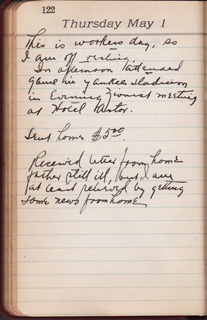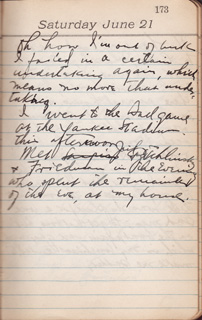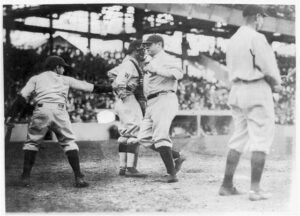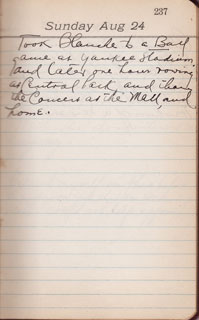
Attend first Baseball game
this spring, an exhibition
between the Yankees and Dodgers
——–
Matt’s Notes
Baseball!
The season was a little shorter and started a little later back then, but Yankee Stadium looked familiar:

The above photo is from 1923 and shows the Stadium surrounded by what appears to be a country road, but as the New York Times noted in its account of the game Papa saw,
By the Yanks’ opening day, April 23, the paving of the streets around the arena will have been finished and motorists will find it an easier task to drive up to the gates. [It’s hard to imagine this ever being the case – ed.] The new subway station at 161st Street was in service yesterday, and the Yanks will soon be all set for the season.
Since the subway was running, Papa likely took the IRT from Canal Street to 161st to the Stadium, where defending champion Yankees fell to the Brooklyn Robins, 10-8, before a crowd of 12,000. (The nickname of the Brooklyn club changed from “Trolley Dodgers” to “Robins” and then back to “Dodgers” over the years; 1924 must have been a transition period, since the Times used both names interchangeably.)
Papa was a big baseball fan (I’ve inherited his baseball-loving gene in the same way I’ve inherited his movie-loving gene) and, with all he’d had on his mind for the previous few weeks, a day at the ball park would have been a welcome diversion (even if it was a bit chilly at 54 degrees and Babe Ruth “fanned lugubriously twice,” as the Times put it).
Here’s who was on the field that day:
Brooklyn
Dick Loftus, cf
Jimmy Johnston, 3b
Zack Wheat, lf
Jack Fournier, 1b
Tommy Griffith, rf
Joe Klugman, 2b
Johnny Jones, ss
Hank DeBerry c
Dutch Ruether, p
Dazzy Vance, p
Andy High
Leo Dickerman, p
New York
Whitey Witt, cf
Joe Dugan, 3b
Babe Ruth, rf
Wally Pipp, fb
Bob Meusel, lf
Aaron Ward, 2b
Everett Scott, ss
Fred Hofmann, c
Chick Autrey, c
Oscar Roettger,p
Earle Combs
Harvey Hendrick
Head over to baseball-reference.com for more on the 1924 Brooklyn Robins and 1924 New York Yankees.
—————-
Image source: Yankee Stadium, 4/3/23. Library of Congress # LC-B2- 5958-11. No known restrictions on publication.











 The highlight of the day was an inside-the-park home run by Yankees slugger Bob Meusel (Babe Ruth must have walked a lot since he only recorded 5 at bats for both games) though for me, once again, the most impressive details in the box scores are the game times — both games clocked out at 2:05, meaning the Yankees banged out a double header in the time it takes modern-day American league teams to play a single prime-time game.
The highlight of the day was an inside-the-park home run by Yankees slugger Bob Meusel (Babe Ruth must have walked a lot since he only recorded 5 at bats for both games) though for me, once again, the most impressive details in the box scores are the game times — both games clocked out at 2:05, meaning the Yankees banged out a double header in the time it takes modern-day American league teams to play a single prime-time game.



